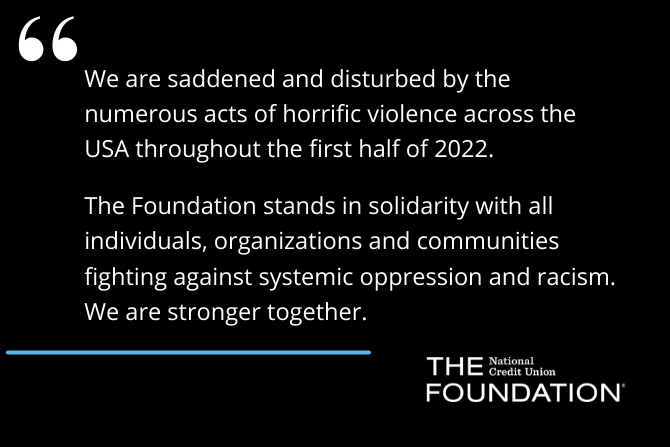What do credit unions stand for?

After so much violence and hatred recently, the Foundation’s Director of Programs & Impact, Chad Helminak, challenges credit unions to consider what we stand for, as much as what we fight against.
Economic inequality drives a deep and real wedge between the haves and have-nots. This goes well beyond someone’s financial position. Wealth influences whether or not someone’s voice is heard. And it means that no matter how hard and how high some people “pull their bootstraps up”, the deck will always be stacked against them.
As credit unions, we fight against economic inequality and injustice. If we consider what we stand for, it boils down to this: Financial Democracy.
This isn’t a new idea. The tenets of Financial Democracy are otherwise known as the “Cooperative Principles”. But it’s not always clear what those principles mean and what our commitment is to uphold them.
Some see the Cooperative Principles as something that’s optional or not related to business. Seldom do we take time to reflect on how they influence our choices and our actions.
If we forget that we stand for Financial Democracy, we do so at the peril of everything this movement has built over the past 150 years. While we have historically struggled with consumer awareness of credit unions and telling our story, we face obscurity if we forget who we are in the midst of a revolution.
I offer a rebrand of the Cooperative Principles to help us reflect on what we stand for. These are the ideals that credit unions should boldly put into action and make no apologies for:
- We Stand for the Financial Well-Being of ALL People (Voluntary and Open Membership). We serve without discrimination and actively seek out diverse and underserved populations. Those who have faced financial inequities. Those who may not look like us or live in our neighborhood. We do not wait for them to come to us. We invite them to become members, access affordable financial services, and work with us to strengthen our credit union and community.
- We Stand for the Belief That Money Does Not Equal Power (Democratic Member Control). We invite our members to vote and elect who represents them within the credit union’s power structure. We do not measure a member’s voice by how many accounts they hold or how much is on deposit. Each member has earned one vote because they belong.
- We Stand for Reciprocating Trust (Member Economic Participation). The capital that credit unions use to build their business comes from members. It’s a symbol of trust in us, and the power we hold as credit unions is given to us by them. Our members must know that because they invested in us, we will invest in them during good times and bad.
- We Stand for Transparency (Autonomy and Independence). We remain beholden, above all, to our members. As our businesses grow and become more complex through partnerships and investments, we cannot forget that all outside influences are secondary to the needs of our members.
- We Stand for Developing Educated and Well-Informed Citizens (Education, Training and Information). We hire top talent, practice empathy and curate resources to provide every ounce of support possible to help members prosper and achieve financial well-being.
- We Stand for Unity (Cooperation Among Cooperatives). We know that the cooperative credit union business model is a virtuous one and can improve people’s lives. Because we are different and create competition in the marketplace, there are forces who want to create division and eliminate us. Sometimes we do it to ourselves. We must stop this. Credit unions are worth fighting for. Our members are worth fighting for. We are stronger when we put differences aside and work together.
- We Stand for, and with, Our Communities (Concern for Community). We know that when our communities suffer, we suffer too. We are a reflection of those we serve. We seek opportunities for sustainable development that make sure people in our communities can find hope and pathways to prosperity.
Some organizations outside of credit unions might be able to adapt some of that language. But no one can stand toe to toe with credit unions if we fully commit, together, to the tenets listed above.
Credit unions stand for Financial Democracy. It’s something that is much bigger than ourselves and more powerful than money. As we look to change the world, we start with ourselves and within our own walls and communities. Let’s create a new paradigm to fight inequity and injustice by lifting up the voices and spirits of those who need it most.
Let’s take a stand, together, and act boldly in ways that remind us of why we exist.
